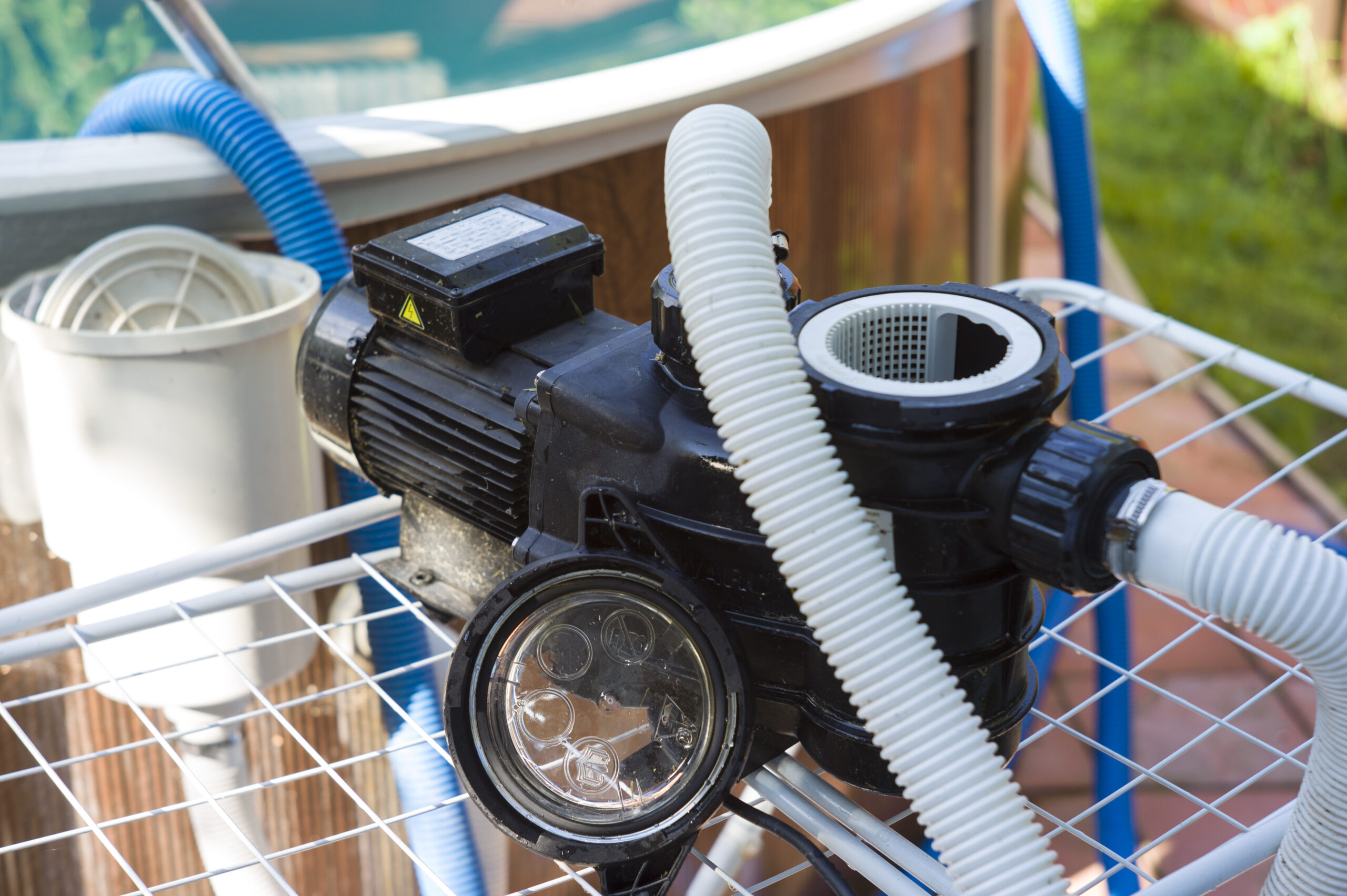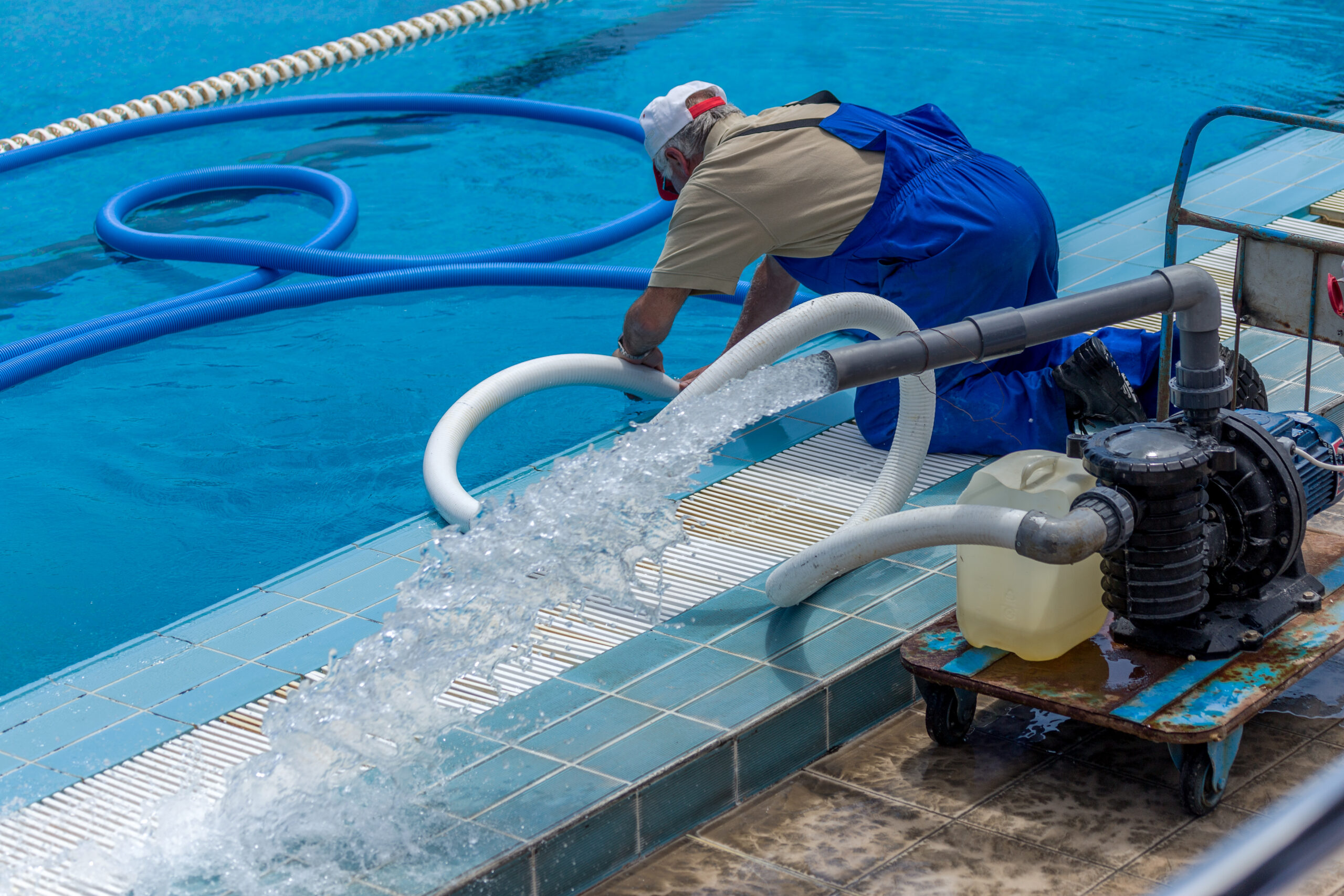You’re set on getting that perfect pool, but you’re puzzled about the pump size. Don’t worry! This article will help you understand how to choose a pump that’s just right for your needs.
You’ll learn about factors affecting selection, correlations between pool size and pump efficiency, and steps to take in making the best choice.
Dive in and become a master of pool pump selection!
Understanding the Basics of Pool Pump Sizes
You’ve got to understand the basics of pool pump sizes before you can make an informed choice. The size of your pool pump directly affects its efficiency and longevity, two critical factors in both pump maintenance and installation procedures.
First off, let’s talk about flow rate, measured in gallons per minute (GPM). You need a pump that can circulate all your pool’s water within 8 hours. To calculate this, divide your pool volume by 480. For instance, if you’ve got a 24,000-gallon pool, you’d need a 50 GPM pump.
Next up is horsepower (HP), which should be proportional to your pool’s size and plumbing infrastructure. If your HP is too high for your pipes’ diameter or flow rate capability, it’ll cause unnecessary pressure leading to potential damage and increased maintenance needs.
Pump Installation also requires careful consideration of the physical dimensions of the pump itself. Ensure there’s ample space for easy accessibility during future maintenance sessions.
Lastly, remember that bigger isn’t always better when it comes to pumps. An oversized unit will consume more energy without providing additional benefits while adding extra stress on the system elements – detrimental in the long run.

Factors to Consider When Selecting a Pool Pump Size
When selecting the perfect equipment for your swimming area, there are several factors you need to consider.
Top of these includes pump durability and maintenance needs.
Pump durability is paramount in ensuring long-term efficiency. You wouldn’t want a pump that fails after a short period of use. So, how do you determine this? Look at the material composition; it should be corrosion-resistant and able to withstand constant exposure to water and chemicals without degradation. Also, check if the manufacturer provides any warranty or guarantee on durability.
Maintenance needs are equally important. A high-maintenance pump can be quite a hassle and might result in additional costs down the line. Aim for a model that has easy-to-access filters, strainers, and other parts requiring regular check-ups or replacement. It’ll save you time and money in the long run.
Don’t forget power consumption when selecting your pool pump size either; efficient pumps often have lower operating costs over their lifespan.
Finally, factor in your pool’s volume, flow rate requirement, and head pressure when choosing a suitable pump size-these directly impact your pump’s performance.
Remember: understanding these factors isn’t just beneficial-it’s necessary for mastery of swimming pool maintenance as well as cost-efficient operation.
The Impact of Pool Size and Volume on Pump Selection
It’s crucial to understand that the volume and dimensions of your swimming area significantly influence the type of pump you’ll need. You may face Volume Calculation Challenges, particularly if your pool has an irregular shape or varying depths. To surmount these challenges, you’ll need to apply some mathematical principles, using length, width, and average depth measurements.
Pump Power Variation is another factor tied directly to pool size and volume. A larger pool necessitates a more powerful pump to maintain water circulation effectively. Conversely, an overpowered pump for a small pool not only wastes energy but can also damage your filtration system.
Understanding hydraulic power requirements helps in selecting the right pump size with optimal horsepower (HP). The HP should correlate directly with your pool’s capacity – too little power won’t circulate water efficiently; too much could lead to excessive pressure on your filter system.
Insights Into Energy Efficiency and Pool Pump Sizes
Delving into energy efficiency, you’ll find that a well-calibrated pump can significantly lower your utility bills. It’s not just about the size of the pool and volume of water it contains; it’s also about how efficiently your pump operates.
Here are some crucial Pump Maintenance Tips. Regularly inspect for leaks or unusual noises, which could indicate wear and tear. Clean out debris from skimmer baskets to avoid blockages forcing it to work harder. Also, examine seals often as they play a vital role in maintaining proper pressure levels within the pump.
Now let’s conduct a Cost Benefit Analysis. You might be surprised at how much you could save with an energy-efficient pump over time. Although they may have higher upfront costs, their long-term savings are significant due to reduced power consumption.
You also need to consider variable speed pumps; these can adjust their operation according to pool usage patterns and climatic conditions, thereby delivering extra savings on energy costs.
In essence, selecting the right pool pump size is critical but equally important is ensuring its efficient operation through robust maintenance practices and strategic investment decisions based on sound cost-benefit analysis.
Steps to Take in Choosing the Correct Pool Pump Size
Let’s dive into the process of selecting an appropriate filtration system for your swimming area by focusing on the steps involved.
First, you’ll want to calculate your pool’s volume and flow rate to determine the pump size needed. Remember, it’s not about getting the biggest pump; it’s about finding one that efficiently circulates water through your pool within a certain timeframe.
After identifying the correct pump size, turn your attention towards the Pump Installation Process. It requires precision and technical knowledge; hence, hiring a professional might be beneficial. The installation process includes mounting the pump in an accessible location, connecting plumbing lines accurately, and ensuring electrical setup is done correctly.
Now comes essential Pump Maintenance Tips to prolong its life span: regular cleaning of strainer baskets, monitoring pressure gauge readings for anomalies indicating potential issues like clogged filters or blockages in return lines. Regularly check seals and gaskets for leaks or wear and tear. If detected early, these minor issues can be addressed promptly to avoid major complications down the line.

Frequently Asked Questions
What Are Some Common Errors People Make When Choosing a Pool Pump Size?
You often underestimate pump efficiency, overbuying for your pool’s size. Also, you may make installation mistakes, not considering pipe diameter or distance from the pool. These oversights lead to inefficiencies and additional costs.
How Often Should I Replace My Pool Pump?
You should replace your pool pump every 8-12 years. However, consider the pump’s lifespan and maintenance costs. If you’re constantly repairing it, it’s more cost-effective to replace the unit earlier.
Can I Use a Larger Pool Pump Than Recommended for My Pool Size?
While you can use a larger pump, it’s not advisable. Over-sizing leads to decreased pump efficiency and over cycling consequences like higher energy bills and equipment wear. It’s best to stick to the recommended size.
How Does Weather Affect the Performance of Different Pool Pump Sizes?
Weather greatly impacts pool pump performance. Warmer temperatures require more filtration, hence larger pumps. Colder seasons don’t need as much, so smaller ones suffice. Seasonal adjustments ensure optimal pump efficiency in varying weather conditions.
Can a Professional Help Me in Selecting the Right Pool Pump Size?
Absolutely, a professional can guide you in selecting the right pool pump size. They’ll consider pump efficiency and provide installation guidance to ensure optimal performance and energy consumption for your specific pool requirements.
